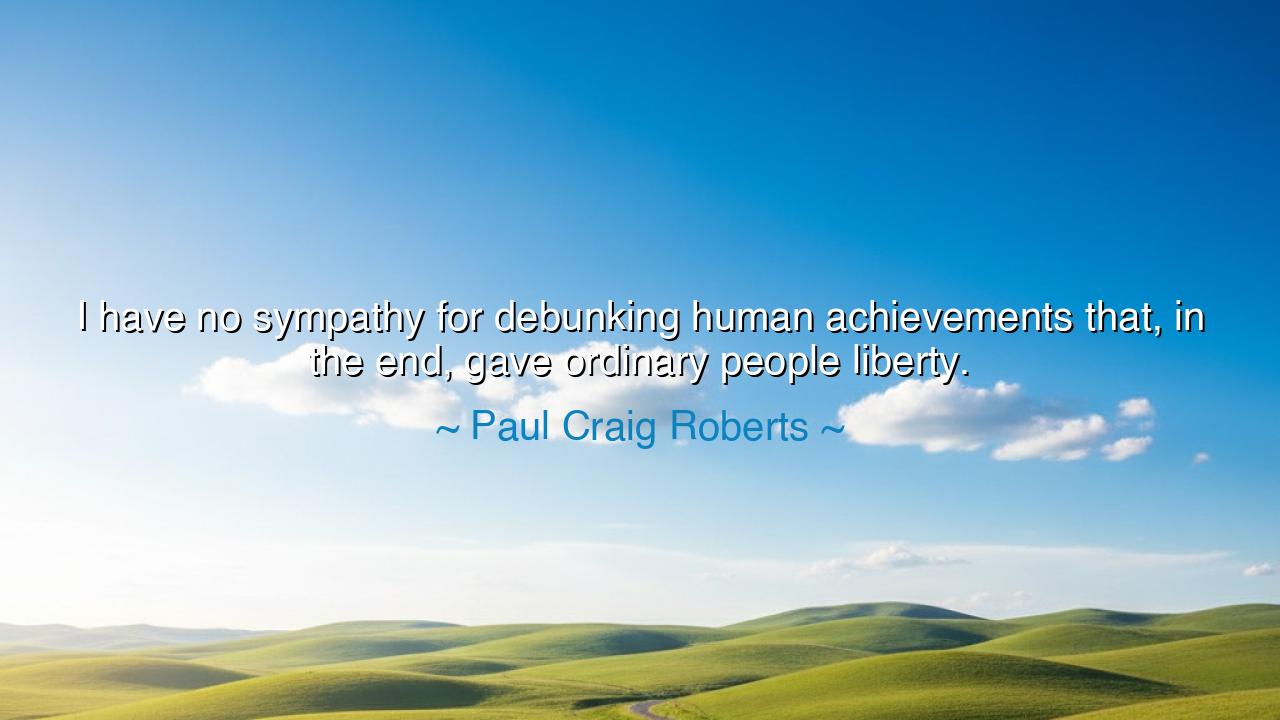
I have no sympathy for debunking human achievements that, in the
I have no sympathy for debunking human achievements that, in the end, gave ordinary people liberty.






In the timeless struggle for freedom and justice, there have been countless achievements that have shaped the course of human history. Paul Craig Roberts, in his assertion, "I have no sympathy for debunking human achievements that, in the end, gave ordinary people liberty," speaks to the deep and unwavering respect for those victories—large and small—that have granted humanity the most sacred of gifts: freedom. Throughout history, individuals and movements have fought tirelessly to secure the rights of the oppressed, and Roberts’ words remind us that while it is easy to critique or diminish these achievements in hindsight, we must never lose sight of the freedom they have made possible.
In the ancient world, the concept of freedom was often confined to a select few—rulers, warriors, or those born into privilege. But even then, the idea of liberty sparked great debates. In Athens, the birthplace of democracy, the philosopher Socrates engaged in dialogues that questioned the nature of freedom, justice, and the role of the individual in society. Yet, despite his inquiries, it was not until the Athenian democracy that ordinary citizens were given the ability to shape their political destiny. The great democratic experiment was not without its flaws, but it laid the groundwork for future movements that would extend freedom beyond the elite and into the hands of the people. Socrates, though critical of the flaws in Athenian democracy, would have understood the importance of these achievements in granting the liberty that all men and women seek.
The echoes of these early struggles for freedom reverberated throughout history, as movements for liberty continued to rise against oppressive forces. One of the most significant human achievements in the pursuit of liberty came in the form of the American Revolution. The men and women who fought for independence from Britain did not merely seek to sever political ties; they sought to establish a system where ordinary people could govern themselves, where freedom was not a privilege but a right. The Declaration of Independence, a cornerstone of this revolution, boldly proclaimed that all men were created equal and had the right to life, liberty, and the pursuit of happiness. It was an achievement that, despite its imperfections and exclusions, laid the foundation for the democratic ideals that would inspire nations and individuals to fight for their own freedom.
However, just as Socrates questioned the nature of democracy, so too have critics in every age sought to debunk or undermine the achievements of those who fought for liberty. Roberts’ words serve as a reminder that while the flaws of historical movements and systems should not be ignored, they should not diminish the noble aims that they served. The abolition of slavery, for example, though a victory for humanity, was followed by bitter struggles that revealed the enduring racism and inequality in society. Yet, the Emancipation Proclamation and the civil rights movements that followed represented human triumphs that provided liberty to millions, regardless of the continued challenges they faced.
The lesson in Roberts’ statement is not just about defending the past but about recognizing the enduring value of these achievements. Just as ancient empires fell and were often remembered for their power and oppression, so too are the great movements for liberty sometimes overshadowed by their imperfections. Yet, we must look beyond the flaws and recognize that the achievements of those who fought for freedom—whether through revolution, reform, or perseverance—are the bedrock upon which we stand today. The liberty we often take for granted was hard-won, and it is our duty to honor it by upholding the values of freedom and justice for all.
As we navigate the present and look toward the future, we must remember that freedom is not something that is simply given but something that must be defended and nurtured. Every generation faces new challenges, new forces that seek to curtail the liberty of individuals. The achievements that Roberts defends remind us that the fight for freedom is not a one-time victory, but a continuous struggle—one that requires us to respect the sacrifices of the past while striving to ensure that the freedoms we enjoy today are preserved for those who come after us.
The practical action we must take is to celebrate the achievements of those who fought for liberty and to acknowledge their imperfections without allowing them to undermine the noble ideals they sought to achieve. Let us learn from history’s great achievements and continue to fight for freedom, not just for ourselves, but for all those who remain oppressed. Like the heroes of the past, we too must be willing to stand up for what is right, to defend the liberties that are the birthright of every human being, and to ensure that these freedoms endure for generations to come.






AAdministratorAdministrator
Welcome, honored guests. Please leave a comment, we will respond soon